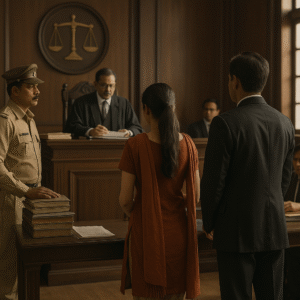Simplified Explanation of the Judgment
The Patna High Court has overturned the dismissal of a Block Supply Officer who was accused of accepting bribes from Public Distribution System (PDS) dealers in Kishanganj district. The Court found that the departmental proceedings lacked any evidence to support the serious allegations, and that the official was denied basic principles of natural justice.
The petitioner was serving as a Block Supply Officer in Kochadhaman when a raid was conducted at his residence by district officials following a complaint from PDS dealers. A sum of ₹25,000 and some official registers were allegedly recovered from his house. Based on this, a First Information Report (FIR) was filed and a departmental inquiry was initiated. The petitioner was suspended on 4 July 2015.
In his defense, the petitioner claimed he was framed by the PDS dealers who were unhappy with his strict enforcement of regulations. He stated that only ₹1,320 was found in his personal possession during the raid and that the remaining amount was found elsewhere in the house, not in his hands. He also pointed out that his signature was not taken on the seizure list and that the raid took place in the presence of a local MLA, raising concerns of political motivation.
The Enquiry Officer submitted two reports (one in 2016 and another in 2019). In both, the officer did not find any of the charges to be proven. The reports highlighted procedural lapses, lack of proper seizure documentation, and a possible conspiracy. However, the disciplinary authority ignored these findings and issued multiple “second show cause” notices claiming the charges were proved. Eventually, the petitioner was dismissed from service on 16 August 2019.
The High Court noted several major flaws:
- No witness, including the complainant or raiding officers, was examined during the inquiry.
- No oral evidence was presented.
- The seizure list lacked the petitioner’s signature.
- The Enquiry Officer’s findings, which doubted the integrity of the raid and questioned political involvement, were ignored.
- The disciplinary authority did not provide reasons for disagreeing with the Enquiry Officer’s report.
The Court ruled this to be a textbook case of “no evidence,” and emphasized that disciplinary proceedings must meet a minimum threshold of fairness and objectivity, especially when they involve serious charges like corruption.
Accordingly, the dismissal order was quashed, and the petitioner was granted all consequential benefits as though no dismissal had taken place. Since the petitioner had retired during the case, the State was directed to process his retirement dues as per law.
Significance or Implication of the Judgment
This judgment reinforces two key legal principles:
- Disciplinary Proceedings Must Be Evidence-Based: Even in administrative settings, basic legal standards such as presenting witnesses and evidence cannot be ignored, especially in corruption allegations.
- Natural Justice is Fundamental: Disregarding inquiry reports without providing reasons or failing to respond to replies from the accused violates natural justice. Courts will not hesitate to intervene.
For government employees, especially at the block or district level, this case is a reminder that the system must operate fairly even when political or local pressures exist. For the administration, it underscores the importance of procedural discipline while handling corruption complaints.
Legal Issue(s) Decided and the Court’s Decision with Reasoning
- Was the dismissal of the officer justified based on the departmental proceedings?
- Court’s Finding: No. There was no evidence presented. Even the complainant was not examined.
- Did the disciplinary authority violate principles of natural justice?
- Court’s Finding: Yes. The authority failed to address the petitioner’s defense and overruled the inquiry officer without valid justification.
- Can a writ petition be entertained despite availability of appeal?
- Court’s Finding: Yes. The case involved serious violations of natural justice and no evidence, making High Court intervention necessary.
- Did the departmental authority act in a legally valid manner?
- Court’s Finding: No. The second show-cause notices and final dismissal were arbitrary and unsupported by the inquiry report.
Judgments Referred by Parties
- Roop Singh Negi v. Punjab National Bank, (2009) 2 SCC 570
- State of U.P. v. Saroj Kumar Sinha, (2010) 2 SCC 772
- Popcorn Entertainment v. CIDCO, (2007) 9 SCC 593
- Whirlpool Corp. v. Registrar of Trade Marks, (1998) 8 SCC 1
- Oryx Fisheries v. Union of India, (2010) 13 SCC 427
- Punjab National Bank v. Kunj Behari Mishra, (1998) 7 SCC 84
Judgments Relied Upon or Cited by Court
- Union of India v. Gyan Chand Chattar, (2009) 12 SCC 78
- Commissioner of Police v. Jai Bhagwan, (2011) 6 SCC 376
Case Title
Upendra Prasad Mandal v. The State of Bihar & Ors.
Case Number
CWJC No. 22251 of 2018
Citation(s)
2021(1)PLJR 111
Coram and Names of Judges
Hon’ble Mr. Justice Chakradhari Sharan Singh
Names of Advocates and Who They Appeared For
• Mr. Y.V. Giri, Sr. Adv., with Mr. Sanjay Kumar Giri and Mr. Pratyush Pratap Singh — for the petitioner
• Mr. S. Raza Ahmad, AAG-5, with Mr. Alok Ranjan, AC to AAG-5 — for the State
Link to Judgment
https://patnahighcourt.gov.in/viewjudgment/MTUjMjIyNTEjMjAxOCMxI04=-PxNU5uyWl0I=
If you found this explanation helpful and wish to stay informed about how legal developments may affect your rights in Bihar, you may consider following Samvida Law Associates for more updates.








